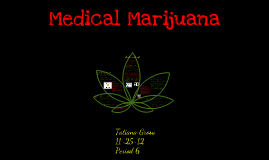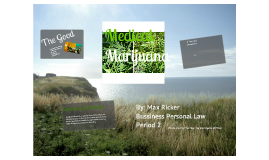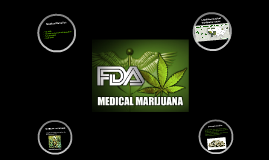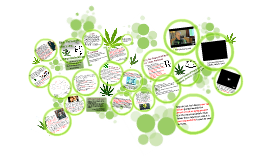Medical Marijuana
Transcript: See Through the Lies: Decriminalize An Argument for the Decriminalization of Medical Marijuana Tetrahydrocannabinol, or THC, is the active ingredient in Marijuana. It is used safely, effectively and responsibly by millions of patients all over the world, and its use dates back to about 2500 B.C. (Rudgley, 49). There is only one problem with this drug: it is classified as a Schedule I substance in the United States under the Controlled Substances Act, a federal law which makes it illegal in all 50 states (Drug Enforcement Agency). Other Schedule I Drugs: Heroin, PCP, Ecstasy LSD, Mescaline, GHB Schedule II Drugs: Cocaine, Opium, Oxycontin, Methamphetamine Possession of marijuana: -misdemeanor punishable by a maximum $1,000 fine and up to a year in prison Sale or cultivation of less than 50 kilograms of marijuana: -felony punishable by a maximum $250,000 fine and up to five years in prison. Sale or cultivation of over 1000 kilograms of marijuana: -felony punishable by a maximum $10,000,000 fine and up to life in prison (DEA). “Penalties against drug use should not be more damaging to an individual than the use of the drug itself. Nowhere is this more clear than in the laws against the possession of marijuana in private for personal use.” -Jimmy Carter, 1977 One of the most common myths about marijuana is that it kills brain cells. This misconception originated in a study known as the Shafer Report, conducted under the Nixon administration in 1972. According to the Substance Abuse and Mental Health Services Association’s 2001 National Household Survey on Drug Abuse, this study consisted of a sample group of monkeys who were hooked up to gas masks and given 63 joints worth of high-grade marijuana smoke over a time period of five minutes. The monkeys received only smoke and no oxygen over these five minutes (SAMHSA, 132). Three to five minutes without oxygen causes brain cells to begin to die. The study concluded that marijuana kills brain cells and the rumors began. "The evidence in this record [9-6-88 ruling] clearly shows that marijuana has been accepted as capable of relieving the distress of great numbers of very ill people, and doing so with safety under medical supervision. It would be unreasonable, arbitrary and capricious for DEA to continue to stand between those sufferers and the benefits of this substance in light of the evidence in this record." -- Judge Francis L. Young DEA Administrative Law Judge Sep. 1988 While working on this presentation, a VCU cop walked by outside and I asked him, "What is your opinion on medical marijuana?" He said, "Don't quote me by name on this...but it worked for my dad. He had pancreatic cancer. And it helped him. A lot." ""The evidence is overwhelming that marijuana can relieve certain types of pain, nausea, vomiting and other symptoms caused by such illnesses as multiple sclerosis, cancer and AIDS -- or by the harsh drugs sometimes used to treat them. And it can do so with remarkable safety. Indeed, marijuana is less toxic than many of the drugs that physicians prescribe every day...tobacco, through its direct physical effects, kills many thousands of people every year. So does alcohol. And it is easy to fatally overdose on alcohol, just as you can fatally overdose on prescription drugs...I don't believe that anyone has ever died from a marijuana overdose." Joycelyn Elders, MD Former U.S. Surgeon General Dec. 14, 2002 443,000 – Tobacco Related Deaths (CDC, 2004) 79,000 – Alcohol Related Deaths (CDC, 2005) 4,451 – Prescription Painkiller Deaths (CDC, 2002) 0 – Marijuana Related Deaths The DEA’s primary counterargument to medical marijuana decriminalization is stated on their website: “[It is] important to realize that the campaign to allow marijuana to be used as medicine is a tactical maneuver in an overall strategy to completely legalize all drugs.” They claim, “Smoking marijuana is not recommended for the treatment of any disease condition. In addition, there are more effective medications currently available,” but the effectiveness of medications varies from person to person, and should be up to the individual patient to decide. It seems that in our capitalistic society, profit is valued more than the health and well-being of those who suffer from life-threatening illnesses. The pharmaceutical industry is terrified of allowing the government to allow the use of a drug that they cannot market and profit off of. In a 2007 report, CBS News wrote, “According to a report by the Center for Public Integrity, congressmen are outnumbered two to one by lobbyists for [the pharmaceutical] industry that spends roughly $100 million a year in campaign contributions and lobbying expenses to protect its profits” (Singer, 1). Politicians continue to ignore the facts in order to carry out their own political agendas. Public support for medical marijuana is political suicide. The only type of THC that the government allows is the synthetic form, in a drug called Dronabinol, or

















